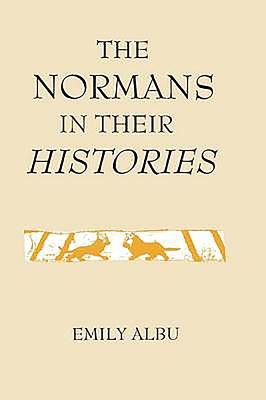
- We will send in 10–14 business days.
- Author: Emily Albu
- Publisher: Boydell Press
- ISBN-10: 0851156568
- ISBN-13: 9780851156569
- Format: 16.1 x 24.3 x 2.7 cm, kieti viršeliai
- Language: English
- SAVE -10% with code: EXTRA
The Normans in Their Histories: Propaganda, Myth and Subversion (e-book) (used book) | bookbook.eu
Reviews
Description
Contemporary historians overtly eulogising the Norman achievement are shown to have employed a variety of literary strategies to convey implicitly their treacherous and predatory ways.
The first Normans were Rollo and his fellow Vikings, marauders from the north, who fashioned the county [later the Duchy] of Normandy from lands won at the mouth of the Seine in about 911, making Rouen their capital. The heirs ofthese pagan Northmen contrived a brilliant transformation of themselves into Christian warriors, and went on to conquer England, southern Italy and Sicily, and even distant Antioch, in the process carving out a dynamic reputationthroughout Western Europe and the Mediterranean.Norman princes encouraged the celebration of these remarkable achievements in histories written to verify the legitimacy of their claims to settle and dominate their lands. From Dudo of Saint-Quentin [late tenth/early eleventh centuries] to the twelfth-century vernacular histories of Wace and Benoit, the Norman historical tradition largely acceded to these expectations: beneath the surface, however, virtually all the histories told a contrary story, condemning the Normans as treacherous to kin and ally as well as to foe. Emily Albu examines the myths the historians fashioned, and the other literary strategies they employed, to expose and explain the wolfish predation at the core of Normanness. EMILY ALBU is Assistant Professor of Classics, University of California, Davis.
EXTRA 10 % discount with code: EXTRA
The promotion ends in 21d.23:21:02
The discount code is valid when purchasing from 10 €. Discounts do not stack.
- Author: Emily Albu
- Publisher: Boydell Press
- ISBN-10: 0851156568
- ISBN-13: 9780851156569
- Format: 16.1 x 24.3 x 2.7 cm, kieti viršeliai
- Language: English English
Contemporary historians overtly eulogising the Norman achievement are shown to have employed a variety of literary strategies to convey implicitly their treacherous and predatory ways.
The first Normans were Rollo and his fellow Vikings, marauders from the north, who fashioned the county [later the Duchy] of Normandy from lands won at the mouth of the Seine in about 911, making Rouen their capital. The heirs ofthese pagan Northmen contrived a brilliant transformation of themselves into Christian warriors, and went on to conquer England, southern Italy and Sicily, and even distant Antioch, in the process carving out a dynamic reputationthroughout Western Europe and the Mediterranean.Norman princes encouraged the celebration of these remarkable achievements in histories written to verify the legitimacy of their claims to settle and dominate their lands. From Dudo of Saint-Quentin [late tenth/early eleventh centuries] to the twelfth-century vernacular histories of Wace and Benoit, the Norman historical tradition largely acceded to these expectations: beneath the surface, however, virtually all the histories told a contrary story, condemning the Normans as treacherous to kin and ally as well as to foe. Emily Albu examines the myths the historians fashioned, and the other literary strategies they employed, to expose and explain the wolfish predation at the core of Normanness. EMILY ALBU is Assistant Professor of Classics, University of California, Davis.


Reviews